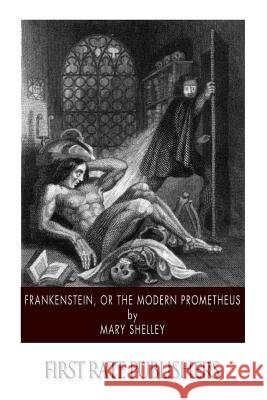Frankenstein, or the Modern Prometheus » książka
Frankenstein, or the Modern Prometheus
ISBN-13: 9781497572959 / Angielski / Miękka / 2014 / 126 str.
Frankenstein, or the Modern Prometheus
ISBN-13: 9781497572959 / Angielski / Miękka / 2014 / 126 str.
(netto: 22,64 VAT: 5%)
Najniższa cena z 30 dni: 23,77
ok. 16-18 dni roboczych.
Darmowa dostawa!
Mary Shelley (1797-1851) was a British novelist, short story writer, dramatist, essayist, biographer, and travel writer, best known for her Gothic novel Frankenstein: or, The Modern Prometheus (1818). She also edited and promoted the works of her husband, the Romantic poet and philosopher Percy Bysshe Shelley. In 1816, the couple famously spent a summer with Lord Byron, John William Polidori, and Claire Clairmont near Geneva, Switzerland, where Mary conceived the idea for her novel Frankenstein. The Shelleys left Britain in 1818 for Italy, where their second and third children died before Mary Shelley gave birth to her last and only surviving child, Percy Florence. In 1822, her husband drowned when his sailing boat sank during a storm in the Bay of La Spezia. A year later, Mary Shelley returned to England and from then on devoted herself to the upbringing of her son and a career as a professional author. The last decade of her life was dogged by illness, probably caused by the brain tumour that was to kill her at the age of 53. Shelley's other writings have grabbed more attention in the last 50 years, but she is still known around the world today for Frankenstein. Shelley had traveled the region in which the story takes place, and the topics of the occult ideas were themes of conversation among her companions. The actual storyline came from one of Shelley's dreams, about a scientist who created life and was horrified by what he created. From a literary standpoint, Frankenstein is infused with some elements of the Gothic novel and the Romantic movement and is also considered to be one of the earliest examples of science fiction. Shelley also had an underlying theme in her novel about the expansion of modern man in the Industrial Revolution, which is alluded to in the novel's subtitle, The Modern Prometheus. The story has spawned a complete genre of horror stories and films.
Zawartość książki może nie spełniać oczekiwań – reklamacje nie obejmują treści, która mogła nie być redakcyjnie ani merytorycznie opracowana.











